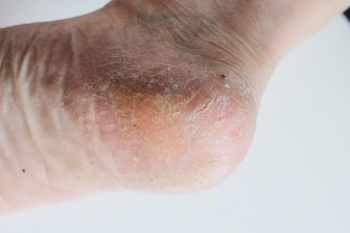Causes and Symptoms of Cracked Heels
 Cracked heels, or heel fissures, are often seen as a nuisance or a cosmetic issue but can become painful and even infected if left untreated. Dry skin, particularly when the skin surrounding the rim of the heel is thickened or callused, is a primary cause of cracked heels. Factors include prolonged standing on hard floors, biomechanical issues, obesity, and frequently wearing open-back shoes. Women are especially prone to developing cracked heels, reporting the condition at a rate over 50 percent higher than men. Visual symptoms are evident with cracks or fissures in the heel area, potentially leading to discomfort, pain, and bleeding. Infections can occur, signaled by redness, swelling, warmth, and pain upon touch. Medical conditions, including diabetes, psoriasis, and fungal infections, can predispose individuals to dry skin and increase the likelihood of cracked heels. A chiropodist can offer tailored treatment plans, address underlying conditions, and recommend suitable footwear to prevent cracked heels. If you have cracked heels that may be infected or are causing pain, it is suggested that you schedule an appointment with a chiropodist for relief.
Cracked heels, or heel fissures, are often seen as a nuisance or a cosmetic issue but can become painful and even infected if left untreated. Dry skin, particularly when the skin surrounding the rim of the heel is thickened or callused, is a primary cause of cracked heels. Factors include prolonged standing on hard floors, biomechanical issues, obesity, and frequently wearing open-back shoes. Women are especially prone to developing cracked heels, reporting the condition at a rate over 50 percent higher than men. Visual symptoms are evident with cracks or fissures in the heel area, potentially leading to discomfort, pain, and bleeding. Infections can occur, signaled by redness, swelling, warmth, and pain upon touch. Medical conditions, including diabetes, psoriasis, and fungal infections, can predispose individuals to dry skin and increase the likelihood of cracked heels. A chiropodist can offer tailored treatment plans, address underlying conditions, and recommend suitable footwear to prevent cracked heels. If you have cracked heels that may be infected or are causing pain, it is suggested that you schedule an appointment with a chiropodist for relief.
Dry, cracked heels are more than a cosmetic inconvenience. For many people, they are uncomfortable, deep, painful, and may even bleed. If you suffer from cracked heels, please consult with one of the chiropodists from The Footcare Centre. Our chiropodists can help you maintain the health of your lower limbs and your mobility.
Causes
Prolonged standing
Wearing open-back shoes
Wearing shoes that don’t cushion the heels
Living in a cold or dry climate
Taking long, hot showers
Not moisturizing the heels
Eczema
Psoriasis
Palmoplantar keratoderma
Juvenile plantar dermatosis
Treatments
Soaking the feet
Exfoliating with a pumice stone
Moisturizing the heels
Wearing closed-back shoes that cushion heels
Avoiding prolonged standing
Taking warm, rather than hot, showers
Treating underlying skin conditions
While milder cases of cracked heels can be treated at home, some patients present with deep, painful, bleeding heel fissures that are at risk of becoming infected and may require medical care. Additionally, patients with diabetes or any other conditions that affect the immune system should be monitored by a chiropodist.
If you have any questions, please feel free to contact our office located in . We offer the newest diagnostic and treatment technologies for all your foot care needs.
